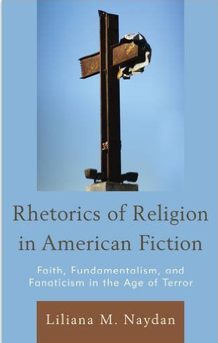 John Updike Society member Liliana M. Naydan, Assistant Professor of English and Writing Program Coordinator at Penn State Abington, has recently published a book on writers and religion that includes (not surprisingly) a chapter on Updike.
John Updike Society member Liliana M. Naydan, Assistant Professor of English and Writing Program Coordinator at Penn State Abington, has recently published a book on writers and religion that includes (not surprisingly) a chapter on Updike.
According to the Amazon.com description, Rhetorics of Religion in American Fiction: Faith, Fundamentalism, and Fanaticism in the Age of Terror (234pp., Bucknell Univ. Press) “considers the way in which contemporary American authors address the subject of belief in the post-9/11 Age of Terror. Naydan suggests that after 9/11, fiction by Mohsin Hamid, Laila Halaby, Philip Roth, Don DeLillo, John Updike, and Barbara Kingsolver dramatizes and works to resolve impasses that exist between believers of different kinds at the extremes. These impasses emerge out of the religious paradox that shapes America as simultaneously theocratic and secular, and they exist, for instance, between liberals and fundamentalists, between liberals and certain evangelicals, between fundamentalists and artists, and between fundamentalists of different varieties. Ultimately, Naydan argues that these authors function as literary theologians of sorts and forge a relevant space beyond or between extremes. They fashion faith or lack thereof as hybridized and hence as a negotiation among secularism, atheism, faith, fundamentalism, and fanaticism. In so doing, they invite their readers into contemplations of religious difference and new ways of memorializing 9/11.”
The essay on Updike is titled “Emergent Varieties of Religious Experience from a Protestant Perspective: Fundamentalist, Fanatical, and Hybrid Faith in John Updike’s ‘Varieties of Religious Experience’ and Terrorist.”
